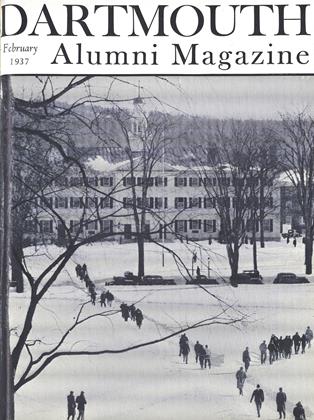GREATEST CANE RUSH IN DARTMOUTH HISTORYDESCRIBED BY FRANK A. NEWELL
FRANK A. NEWELL, born May 26, 185 a, is the oldest living member of the class. Although in college but two years, he is very distinctly remembered by his classmates and by many others who were in College at that time. His "extracurricular" activities, although not always approved by the faculty of the period, made him a popular member of the College community.
He was present at the fiftieth anniversary reunion in 1929, and usually attends the winter dinner of the Boston Alumni. He is a very enthusiastic alumnus of the College and a great admirer of President Hopkins. For several years he has lived happily at a Home for Aged Men in Boston, from which he has recently written an interesting letter to the class secretary, part of which is quoted below.
The "cane rush" to which he refers took place April 12, 1875, the night before Fast Day, a college holiday then as it had been from the beginning. The rush started in Thornton Hall, worked its way down College Street through deep spring mud, out Lebanon Road, and ended in a meadow south of the road at 11.30 P.M. The next day one student recorded in his journal, "Many of the fellows are wearing their best clothes today, and I am very lame all over."
The "Pledge" which as sophomores the class were required to sign is dated September 8, 1876, and is preserved in the office of the College treasurer. A photostat copy is preserved in the class archives. On it are fifty-one names, some of them, judging from the hand-writing, signed under considerable mental stress. For some unexplained reason the members of the Chandler Scientific Department were not required to sign, although a contemporary record indicates that the faculty had reason to regret the omission later.
Mr. Newell's letter: "Boston, Dec. 15, 1936.
"What a wonderful college! And what a wonderful class was good old '79! And as I write these words my mind goes back to those college days long ago. As Freshmen we 'licked' the Sophomore Class in the greatest cane rush in college history. I wonder if you remember the details of that memorable event.
The contest lasted over three hours, and three canes were used. We secured the first cane, which should have ended the contest, but instead, a new cane was brought into play, and after a severe battle, the cane being broken, we got away with the long end, about two thirds. Not satisfied with that and smarting under defeat, the Sophs brought in a third cane, and after battling till many of the men began to fall exhausted, it was agreed to place the cane in the hands of a committee from the two upper classes who should act as referees. They had the cane split from end to end and gave each class one half.
"That memorable contest caused the Faculty to oblige each member of our class [at the beginning of Sophomore year] to sign a pledge to abstain from rushing. We protested and asked that the Freshmen should be bound by the same pledge. We were told to sign unconditionally or take expulsion. (I never signed, but I learned that some good-hearted fellow classmate 'forged' my name.) It was a most unfair ruling, and I learned later from one of the Trustees that they would never have been allowed to carry out their threat.
"We all remember what followed. The Freshmen not being bound, were very 'cocky,' and at a lecture in the College Church one of their members after the church was well filled marched down near the front seats supporting a tall hat on his arm, and placed it on top of the pews where it remained during the lecture. After the lecture, before the hat had reached the sidewalk it was good material for the sparrows to build into nests.
"Someone obligingly threw a cane into the crowd and the game was on,—the Freshmen and Faculty on one side and our class on the other. The Faculty were busy picking out our men and ordering them to their rooms, but never a word to the Freshmen. After some time two Freshmen and myself were the only ones on the cane, when Prof. E— came up and said, 'Newell, drop that cane and go to your room.' My reply was, 'Not till hell freezes over so long as a Freshman is on it.' Soon after I secured the cane and presented it to the Prof, with my compliments, and again '79 were the victors.
"We all remember the 'Parker riot,' our trip to Plymouth Court House, leaving Parker locked up in the Norwich baggage room, our return and ride from the station in a coach drawn by nearly all the students, and later the huge bonfire on the Campus with Parker's effigy on the top leaning on his old familiar book sign. Perhaps this affair was nothing to boast of, but whatever glory there was in it, '79 is entitled to her share.
"I was much interested in the Class Record of '76, especially as Piper and Hardison were mates of mine at fitting school. I have met them several times at the Boston Alumni dinner, and hope to again this year if I am able to go I have been fairly comfortable for the past six months, much better than I was two years ago."
 View Full Issue
View Full Issue
More From This Issue
-
 Article
ArticleGradus Ad Parnassum
February 1937 -
 Class Notes
Class NotesClass of 1911
February 1937 By Nathaniel G. Burleigh -
 Class Notes
Class NotesClass of 1936
February 1937 By Rochard F. Treadway -
 Class Notes
Class NotesClass of 1929
February 1937 By F. William Andres -
 Article
ArticleThe Modern Museum
February 1937 -
 Class Notes
Class NotesClass of 1927
February 1937 By Doane Arnold








